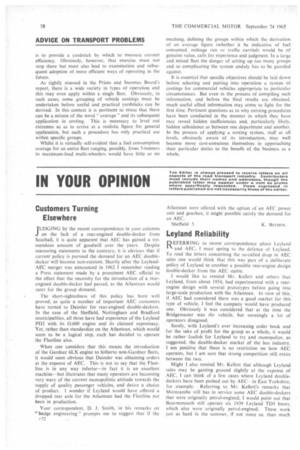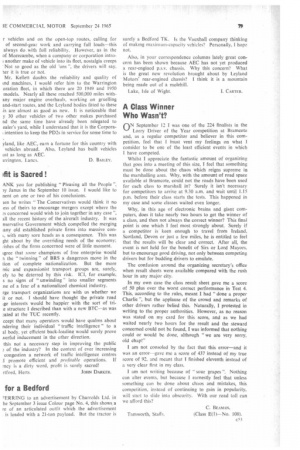IN YOUR OPINION
Page 80

Page 81

If you've noticed an error in this article please click here to report it so we can fix it.
Customers Turning Elsewhere
'FUDGING by the recent correspondence in your columns on the lack of a rear-engined double-decker from Southall, it is quite apparent that AEC has gained a tremendous amount of goodwill over the years. Despite reassuring statements to the contrary, it is obvious that if current policy is pursued the demand for an AEC doubledecker will become non-existent. Shortly after the LeylandAEC merger was announced in 1962 I remember reading a Press statement made by a prominent AEC official to the effect that the necessity for the introduction of a rearcngined double-decker had passed, as the Atlantean would eater for the group demand.
The short-sightedness of this policy has been well proved, as quite a number of important AEC customers have turned to Daimler for rear-engined double-deckers. In the case of the Sheffield, Nottingham and Bradford municipalities, all three have had experience of the Leyland PD2 with its 0.600 engine and its claimed supremacy. Yet, rather than standardize on the Atlantean, which would seem to be a logical step, each has decided to operate the Fleetline also.
When one considers that this means the introduction of the Gardner 6LX engine to hitherto non-Gardner fleets, it would seem obvious that Daimler was obtaining orders at the expense of AEC. This is not to say that the Fleetline is in any way inferior—in fact it is an excellent machine--but illustrates that many operators are becoming very wary of the current monopolistic attitude towards the supply of quality passenger vehicles, and desire a choice of product. I wonder if Leyland would have offered a dropped rear axle for the Atlantean had the Fleetline not been in production.
Your correspondent, D. J. Smith, in his remarks on "badge engineering prompts me to suggest that if the e52 Atlantean were offered with the option of an AEC power unit and gearbox, it might possible satisfy the demand for an AEC.
Sheffield 5. K. BEF.DEN.
Leyland Reliability
REFERRING to recent correspondence about Leyland
and AEC, I must spring to the defence of Leyland. To read the letters concerning the so-called drop in AEC sales one would think that this was part of a deliberate policy of Leyland to smother a possible rear-engine design double-decker from the AEC stable.
I would like to remind Mr. Kellett and others that Leyland, from about 1954, had experimented with a rearengine design with several prototypes before going into large-scale production with the Atlantean. In view of this, if AEC had considered there was a good market for this type of vehicle, I feel the company would have produced one. Obviously it was considered that at the time the Bridgemaster was the vehicle, but seemingly a lot of operators disagreed.
Surely, with Leyland's ever increasing order book and for the sake of profit for the group as a whole, it would be rather foolish for Leyland to try and monopolize, as suggested, the double-decker market of the bus industry. I am positive that there is no restriction on how AEC operates, but I am sure that strong competition still exists between the two.
Might I also remind Mr. Kellett that although Leyland sales may be gaining ground slightly at the expense of AEC, I can think of a few cases where Leyland doubledeckers have been pushed out by AEC—in East Yorkshire. for example. Referring to Mr. Kellett's remarks that Morecambe still has in service some AEC double-deckers that were originally petrol-ertgined, I would point out that Bournemouth still operate six 1939 Leyland TD5 buses, which also were originally petrol-engined. These work just as hard in the summer, if not more so. than much r vehicles and on the open-top routes, calling for of second-gear work and carrying full loads—this always do with full reliability. However, as in the of Morecambe, when a company or corporation intro; another make of vehicle into its fleet, nostalgia creeps Not so good as the old 'tins ", the drivers will say, ler it is true or not.
Mr. Kellett doubts the reliability and quality of ind machines, I would refer him to the Warrington oration fleet, in which there are 20 1949 and 1950 models. Nearly all these reached 500,000 miles withany major engine overhauls, working on gruelling and-start routes, and the Leyland bodies tilted to these is are almost as good as new. It is noticeable that y 30 other vehicles of two other makes purchased ad the same time have already been relegated to ealer's yard, while I understand that it is the Corpora. intention to keep the PD2s in service for some time to yland, like AEC, earn a fortune for this country with vehicles abroad. Also, Leyland has built vehicles ust as long as AEC.
Irrington, Lancs. D. BAILEY.
Ifit is Sacred !
ANK you for publishing "Pleasing all the People ", )y Janus in the September 10 issue. I would like to nent on one or two of his conclusions.
len he writes " The Conservatives would think it no ess of theirs to encourage mergers except where the concerned would wish to join together in any case all the recent history of the aircraft industry. It was nservative Government which compelled the merging any old established private firms into massive con1, with many sore heads as a consequence. This was ght about by the overriding needs of the economy: dshes of the firms concerned were of little moment. Luce that some champions of free enterprise would a the " twinning " of BRS a dangerous move in the Lion of complete nationalization. But the more mic and expansionist transport groups are, surely, ely to be deterred by this risk. ICI, for example.
s no signs of "unwinding" into smaller segments ise of a fear of a nationalized chemical industry.
rge transport organizations are with us whether we it or not. I should have thought the private road ,ge interests would be happier with the sort of trie structure I described than with a new BTC--as was mted at the TUC recently.
ccept that many operators would have qualms about ndering their individual "traffic intelligence" to a al body, yet efficient back-loading would surely prove Aierful inducement in the other direction.
this not a necessary step in improving the public of the industry? In the context of ever increasing congestion a network of traffic intelligence centres promote efficient and profitable operations. If mcy is a dirty word, profit is surely sacred!
rtford. Herts. JOHN DARKER.
for a Bedford
=.ER R NG to an advertisement by Charrolds Ltd. in he September 3 issue Colour page No. 4, this shows, a re of an articulated outfit which the advertisement is loaded with a 21-ton payload. But the tractor is
surely a Bedford TK. Is the Vauxhall company thinking of making maximum-capacity vehicles? Personally, I hope not.
Also, in your correspondence columns lately great concern has been shown because AEC has not yet produced rear-engined p.s.v. chassis. Why this concern? What is the great new revolution brought about by Leyland Motors' rear-engined chassis? I think it is a mountain being made out of a molehill.
Lake, Isle of Wight. I. CARTER.
A Class Winner Who Wasn't?
QN September 12 I was one of the 224 finalists in the
Lorry Driver of the Year competition at Bramcote and, as a regular competitor and believer in this competition, feel that I trust vent my feelings on what I consider to be one of the least efficient events in which I have competed.
Whilst I appreciate the fantastic amount of organizing that goes into a meeting of this size, I feel that something must be done about the chaos which reigns supreme in the marshalling area. Why, with the amount of road space available at Bramcote, could not the roads have been used for each class to marshall in? Surely it isn't necessary for competitors to arrive at 9.30 a.m, and wait until 1.15 p.m. before their class starts the tests. This happened in my case and some classes waited even longer.
Why, in this age of electronic brains and giant computers, does it take nearly two hours to get the winner of a class, and then not always the correct winner? This final point is one which I feel most strongly about. Surely if a competitor is keen enough to travel from Ireland. Scotland, Devon or just a few miles, he is entitled to feel that the results will be clear and correct. After all, the event is not held for the benefit of Sirs or Lord Mayors, but to encourage good driving, not only between competing drivers but for budding drivers to emulate.
The confusion around the organizing secretary's office when result sheets were available compared with the rush hour in any major city.
In my own case the class result sheet gave me a score of 50 plus over the worst correct performance in Test 4. This, according to the rules, meant I had "done a proper Charlie ", but the applause of the crowd and remarks of other drivers rather belied this. Naturally, I protested in writing to the proper authorities. However, as no reason was stated on my card for this score, and as we had waited nearly two hours for the result and the steward concerned could not be found, I was informed that nothing could or would be done, although "we are very sorry, old chap!"
I am not consoled by the fact that this error—and it was an error-gave me a score of 437 instead of my true score of 92, and meant that I finished eleventh instead of a very clear first in my class.
I am not writing because of "sour grapes ". Nothing can alter events, but because I earnestly feel that unless something can be done about chaos and mistakes, this competition, instead of continuing to gain in popularity, will start to slide into obscurity. With our road toll can we afford this?
C. BEAMAN,
























































































































